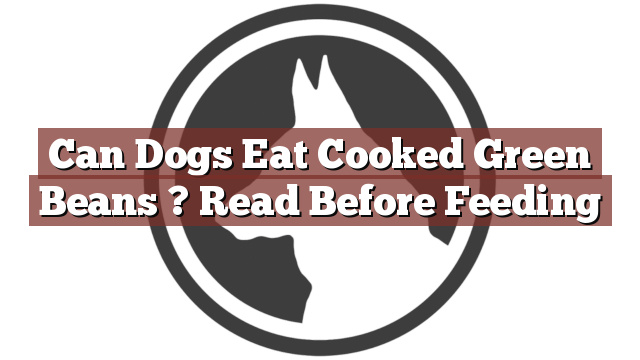Understanding Your Dog’s Dietary Needs
As a responsible pet owner, it is crucial to understand your dog’s dietary needs in order to provide them with a balanced and healthy diet. Dogs are omnivores, which means they can eat a variety of foods, including both meat and vegetables. However, not all human food is safe for dogs to consume. It’s important to know what foods are safe and beneficial for your furry friend.
Can Dogs Eat Cooked Green Beans? Read Before Feeding
Can dogs eat cooked green beans? The answer is yes! Cooked green beans can be a nutritious and safe addition to your dog’s diet. Green beans are low in calories and contain essential vitamins and minerals that can benefit your dog’s overall health. They are a great source of fiber, which can aid in digestion and promote a healthy bowel movement for your pet.
However, it’s important to note that while cooked green beans are safe for dogs, certain seasonings or additives commonly used in human cooking can be harmful. Avoid giving your dog green beans that are seasoned with salt, garlic, onions, or other spices, as these can be toxic to dogs. Plain, unseasoned cooked green beans are the best option for your furry friend.
Pros and Cons of Feeding Cooked Green Beans to Dogs
Feeding cooked green beans to your dog can have several benefits. Firstly, their low-calorie content makes them an excellent choice for dogs that need to lose weight or maintain a healthy weight. Green beans can help your dog feel full without consuming excessive calories, making them a great snack or addition to their regular meals.
In addition, the fiber present in green beans can aid in your dog’s digestion and promote a healthy gastrointestinal system. It can help regulate bowel movements and prevent constipation. The vitamins and minerals found in green beans, such as vitamin C and vitamin K, can also contribute to your dog’s overall well-being.
However, it’s essential to consider the potential drawbacks of feeding cooked green beans to your dog. Some dogs may have difficulty digesting green beans, leading to gas or an upset stomach. If you notice any digestive issues after giving your dog green beans, it’s best to consult with your veterinarian and discontinue feeding this particular food.
Conclusion
In conclusion, dogs can eat cooked green beans, and it can be a healthy addition to their diet. They provide essential nutrients and can aid in weight management and digestion. However, it’s important to feed your dog plain, unseasoned cooked green beans to avoid any potential toxic ingredients. If your dog experiences any digestive issues after consuming green beans, it’s best to consult with your veterinarian. Always prioritize your dog’s health and well-being by feeding them a balanced and appropriate diet.
Thank you for taking the time to read through our exploration of [page_title]. As every dog lover knows, our furry friends have unique dietary needs and responses, often varying from one canine to another. This is why it's paramount to approach any changes in their diet with caution and knowledge.
Before introducing any new treats or making alterations to your dog's diet based on our insights, it's crucial to consult with a veterinarian about [page_title]. Their expertise ensures that the choices you make are well-suited to your particular pet's health and well-being.
Even seemingly harmless foods can sometimes lead to allergic reactions or digestive issues, which is why monitoring your dog after introducing any new food item is essential.
The content provided here on [page_title] is crafted with care, thorough research, and a genuine love for dogs. Nevertheless, it serves as a general guideline and should not be considered a substitute for professional veterinary advice.
Always prioritize the expert insights of your veterinarian, and remember that the health and happiness of your furry companion come first.
May your journey with your pet continue to be filled with joy, love, and safe culinary adventures. Happy reading, and even happier snacking for your canine friend!

